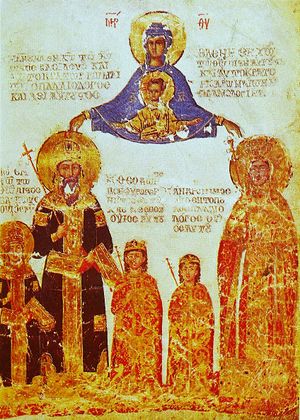Ipomoni of Loutraki
The holy and right believing Empress Helen Dragas Palaiologos ((Greek)
Eλένη Δραγάση; (Serbian) Јелена Драгаш; c.1372 – 1450), also known by her monastic name of Ipomoni, was the daughter of the emperor of the Slavs Constantine Dragasis and the wife of emperor Manuel II Palaiologos of Constantinople. Her name Ipomoni translates in English as Patience. She had six children. Her feast day is celebrated on March 13. Additionally, her memory is celebrated on May 29.
Life
As empress, St. Ipomoni was noted for her pious works. She was pious and honored God and related with people in a godly manner. The philosopher Georgios Plethon writes that as an empress she was well known for her wisdom and justice.
Her husband (as a former emperor) became a monk with the name Mathieu. After his death she became a nun at the Monastery of Kira–Martha, taking the name Ipomoni (also Hipomoni). Although she was the former empress, she helped with all the jobs in the monastery along with the other nuns. She helped to establish a home for old people, with the name "The Hope of the Despaired". The home was located at the Monastery of St. John of the Stone where the relics of St. Patapius of Thebes are also kept.
An early siege of Constantinople occurred when St. Ipomoni and her husband were exiled from 1390 to 1392. She died on March 13, 1450, three years before Constantinople fell to the Ottoman Turks. Her son, emperor Constantine XI Palaiologos, died in the final charge (although some say on the altar table of Hagia Sophia) during the fall of Constantinople on May 29, 1453, while many other Christians were slaughtered by the Ottoman Turk forces of Sultan Mehmet II throughout the city as well as inside the Church of Hagia Sophia.
St. Ipomoni was buried in the Monastery of the Pantocratoras in Constantinople, where her husband and three of their children (of which two were monks as well) were also buried.
After the conquest of Constantinople by the Turks in 1453, Angelis Notaras, a nephew of St. Ipomoni, transferred to Geraneia mountain (at the city Loutraki, near Athens) the relics of St. Patapius of Thebes into a cage. The cave was a place where hermit monks lived since the eleventh century. Also, in that cage is a Byzantine icon of Ss. Patapios and Ipomoni as well as the skull of St. Ipomoni. In 1952, Father Nektarios Marmarinos established the Monastery of St Patapios (Loutraki, Greece) where they still keep the holy skull of St. Ipomoni.
The memory of St. Ipomoni is celebrated on May 29, the day that Constantinople fell to the Ottomans and her son Constantine XI Palaiologos died at the battle.
Reference
- "Life, akolouthia, paraklitikos kanonas and egomia of the holy mother ‘’Saint Hypomone" [Dr. Charalambos Busias, edition of Holy Monastery of Saint Patapios, Loutraki 1999]
- "Saint Hipomoni: History and asmatiki akolouthia" [Archpriest Makrystathis Sotirios, Athens, 1993]
- "Kanon parakletikos & Hairetistirioi oikoi to the Blessed Mother's Saint Hypomone" [Dr. Charalambos Busias, edition of the Holy Monastery of Saint Patapios Loutraki 2007
- «The Holy Monastery of Saint Patapios in Loutraki» [edition of the Metropolis of Corinth, Sikyon, Zemenou, Tarsus and Polyfengous, 2012].
- «The Greek Monasteries» [Ev. Lekkou, Ihnilatis, Athens, 1995].
- "Agiologio of Orthodoxy," [Christos Tsolakidis, Athens, 2001 edition]
- «O Megas Synaxaristis of the Orthodox Church" Saint Patapios, p. (254) - (261) [m Victoras Mattheos, 3rd edition, Metamorfosi Sotiros Monastery, Athens, 1968]
- "Saint Patapios" [Stylianos Papadopoulos, professor of the University of Athens, Holy Monastery of Saint Patapios, Loutraki, Greece, edition 2006).
- "St. Patapios and his miracles," [Dr. Charalambos Busias, edition of Holy Monastery of Saint Patapios Loutraki 2004]
- "Deltos of Miracles of our miraculous father St. Patapios" [Dr. Charalambos Busias, edition of Holy Monastery of Saint Patapios 4th Edition, Loutraki 2011]
External links
Categories > Church History
Categories > Church History
Categories > Church History
Categories > Church History
Categories > Church History
Categories > Liturgics > Feasts
Categories > Liturgics > Feasts
Categories > Liturgics > Feasts
Categories > Liturgics > Feasts
Categories > People > Rulers
Categories > People > Saints
Categories > People > Saints > Byzantine Saints
Categories > People > Saints > Greek Saints
Categories > People > Saints > Saints by century > 15th-century saints
